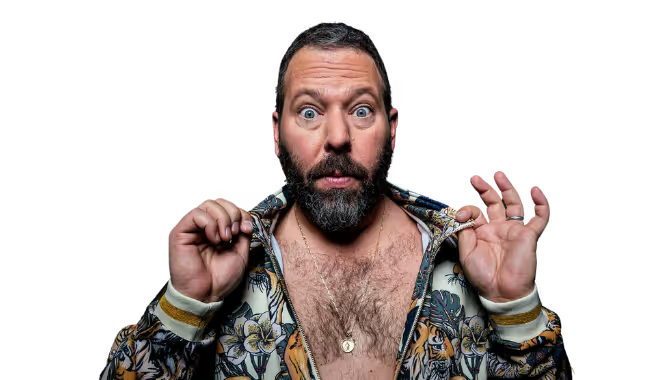


Jay Shetty & Bert Kreischer ON Battling the Inner Critic
In this On Purpose episode, Jay Shetty invites Bert Kreischer, the stand-up comedian best known for his wild stories, shirtless performances, and Netflix specials, including the hit Razzle Dazzle. Kreischer opens up about personal topics like fatherhood, mental health, childhood trauma, and his lifelong search for approval, especially from his emotionally distant father.
What happens when the world's funniest party enthusiast faces his deepest vulnerabilities?
In this On Purpose episode, Jay Shetty invites Bert Kreischer, the stand-up comedian best known for his wild stories, shirtless performances, and Netflix specials, including the hit Razzle Dazzle. Kreischer opens up about personal topics like fatherhood, mental health, childhood trauma, and his lifelong search for approval, especially from his emotionally distant father.Family Life
Bert Kreischer opens up to Jay Shetty about his family life, revealing how comedy plays a role not only on stage but also in his personal life. His wife and daughters mock his red carpet looks, entertaining an atmosphere of direct honesty and banter. Lovingly, they started calling him "baby walrus" because of some funny looks at high-profile events.
The comedian, his wife, and daughters tease each other a lot. However, they make sure to let each other know their jokes are done in a safe space and from a place of love, not as mockery. At home, they express themselves through jokes, not by putting on a mask. Kreischer told Jay Shetty that, to him, it is essential to make fun of life's challenges. This way, they feel easier to tackle and also make the family come closer.
From Serious to Funny
Bert Kreischer admits to Jay Shetty that he was never the class clown growing up. As a child, he was quite serious. He believed his antics were impressive, but not funny. In a Catholic all-boys high school, he found that his storytelling was what captivated the room. So, he started honing his storytelling skills, learned how to build tension and deliver a punchline.
Each mistake taught him how to improve and turn even embarrassing moments into comedy.
The comedian recognizes that these early years taught him essential social skills—the art of performance—long before he ever stepped on a stage. Kreischer’s earliest material emerged almost accidentally, born from bald descriptions of his life experiences. Yet storytelling became the bedrock of his comedy career as a comic who doesn’t write jokes but relives experiences: the pain behind the punchlines.
Father Wounds
Bert Kreischer opened up to Jay Shetty about his childhood, and what it looked like growing up with a strict father. His father was a lawyer and had a serious character. Having lost his own father at only thirteen, he carried a wound he unconsciously passed on to the comedian. In their home, crying and making excuses was not allowed, and he always pushed to comedian to do better.
Kreischer's father had a rigid view of masculinity; he believed men were not allowed to cry and must power through, no matter the circumstances. On his eleventh birthday, the comedian lost a tooth in a baseball game and started to cry. Instead of comforting his child, his father urged him to stay and finish the game, even with a broken tooth.
The comedian saw his father cry for the first time only when he was in college.
When he was denied graduation over a magazine article, his father could no longer hold back his tears. Bert Kreischer told Jay Shetty that that moment of vulnerability marked the point when he started to see his father as an imperfect, flawed, emotional human being, rather than an unyielding authority figure.
High Together
Their bond became even stronger when, unexpectedly, on Easter morning, the comedian’s father ate marijuana-laced popcorn. Unaware of what was happening, he started an emotional conversation, which had never happened before to this extent. Kreischer was caught off guard, but he joined in the fun. He ate some of the popcorn, as well, and leaned into this new chapter of their relationship.
The comedian told Jay Shetty that his father confessed his emotional distance was a mask covering his immense fear of losing his son. Having lost his own father, he was worried that Kreischer's lifestyle might take him away, too, and this very thought kept him up at night.
Seeing his father genuinely concerned for his health, the comedian agreed to undergo a cardiac workup to help ease his father’s fears. This honest conversation was yet another milestone in their relationship. They could now talk more openly and deeply about their feelings, getting to know each other beyond the barriers they had up for so many years.
From Humiliation to Humor
Bert Kreischer has evolved to be able to tell even the most embarrassing stories in a way that makes the audience laugh, no matter how cringeworthy. He told Jay Shetty that his prom date cheated on him, which devastated him. The comedian saw sleeping on the backseat of her car as the only option for him at that moment. Then, his date's father noticed him and invited him into the home. Instead of chasing him or making fun of his heartbreak, he actually took his time to have a personal and emotional conversation about how humiliation was not the way. That very conversation profoundly impacted the comedian.
It was moments of intense distress that Kreischer uses as comedic material in his work. He told Jay Shetty that he always comes out as the fool. But his jokes aren't about puttinh others down or making him look superior. He merely opens up about sensitive moments of his llife, told in a funny way. This approach is what sets him apart on the stand-up comedy scene. He chose to laugh about his pain rather than supressing it.The Long Road to Validation
The comedian admits to Jay Shetty that he has always been chasing his father’s approval, even despite his larger-than-life persona. When he landed a major development deal with Will Smith—earning a six-figure paycheck for a sitcom idea—his father was baffled. For the first time, his dad didn’t have all the answers. It was both unsettling and uplifting for Kreischer.
However, his father always wanted him to strive to become even better. The comedian recounts how, in his early days, his father called him to push him to do something with his life. He insisted he goes to one of the clubs hosting comedy nights and asks to get on stage once. He got rejected, but his father made him try again and again, until they eventually offered him a spot.
Perseverance was what got Kreischer his first break and he never looked back ever since. He told Jay Shetty that the determination instilled in him by his father is what helped him transform public rejection into personal redemption. He learned that approval earned through hard work lasts far longer than validation handed out for free.
Razzle Dazzle: Comedy and Catharsis
Discussing his latest Netflix special, Razzle Dazzle, Kreischer revealed to Jay Shetty that he almost didn’t include the emotional story of his dog's passing, which made audiences around the world sob and laugh simultaneously. Initially, he was hestitant, apprehensive of what his colleagues may think about him ending his show on such a grim note.
But seeing the reactions from the audience convinced him to keep it. He observed grown men openly weeping at the story and realized that he had just struck a universal chord. The comedian's story emotionally resonated with so many people, who may have gone through a similar process of saying goodbye to their pets.
Bert Kreischer told Jay Shetty that, following the show, people started sending him pictures of their own dogs, sharing their own stories of grief. But what touched him most was the thanks he received for making them feel seen and understood. For him, this equaled a validation on a soul-deep level. It was proof that humor and vulnerability can harmoniously coexist.
Staying Grounded
Kreischer explains to Jay Shetty that he approaches each new project as if it could be his last. Whether it’s a special, a movie, or an arena tour, he gives his all—as if it’s the last time he’ll perform. He learned this approach from his producer while filming The Machine movie and has now become a regular practice in his life. He believes that success may disappear overnight and that clinging to fame can be dangerous. Moreover, once you get used to it, its magic fades anyway.
So, Kreischer not only maintains his success but also finds fulfillment by viewing each experience as unique and valuable. Whether performing in sold-out arenas or intimate clubs, it's the work itself that brings him joy rather than the recognition.
Mental Health
Bert Kreischer opened up to Jay Shetty about his mental health struggles.
He suffers from anxiety, OCD, and intrusive thoughts, often arising during flights or in quiet moments. For many years, he relied on Xanax to manage his symptoms until his wife stepped in. Currently, he manages his anxiety through exercise, hydration, sauna sessions, and staying productive.
He describes to Jay Shetty how his daughter’s anxiety enabled him to become a more empathetic parent. He believes that naming and acknowledging a struggle is the first step in the healing process. For the comedian, daily affirmations like “Let’s do today a little better than yesterday” anchor him in the present.
He credits his wife for helping him shape his material and for keeping him grounded. She’s not afraid to critique his comedic tone and remind him to deliver his edgiest jokes with love and care. They share deep mutual respect and collaboration.
More From Jay Shetty
Listen to the entire On Purpose with Jay Shetty podcast episode “Comedian Bert Kreischer: My Constant Battle with My Inner Critic (Overcoming Anxiety, Chasing Approval & The Pressure to Be Funny)” now in the iTunes store or on Spotify. For more inspirational stories and messages like this, check out Jay’s website at jayshetty.me.
Sign up for the only email that puts purpose at the center of your day.




Looking for greater meaning? This quiz shows you how to live with purpose every day.
Take the Quiz
Dreaming of becoming a life coach? This quiz tells you if a coaching career is right for you.
Take the Quiz

Dreaming of becoming a life coach? This quiz tells you if a coaching career is right for you.
Take the Quiz

Everyone communicates differently. Discover your own personal fight style now.
Take the Quiz

Understanding your role in a relationship is the first step to making things work.
Take the Quiz


